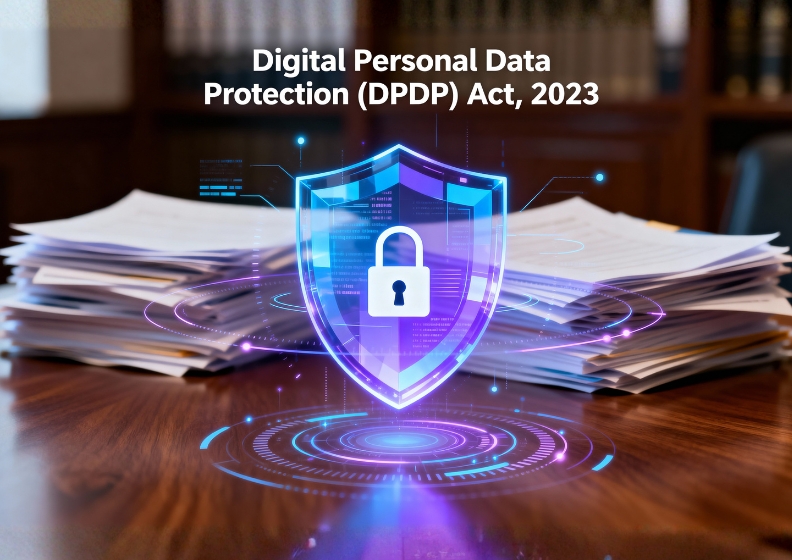In the age of digital transformation, the legal industry stands at a pivotal point of evolution. For years, law firms have been adopting LegalTech to improve internal operations — from managing cases to automating documents and organising legal research.

However, fundamental transformation is not limited to these administrative areas. It truly occurs in the core, public-facing parts of the system, such as how services are delivered, how people interact with the system, and how justice is accessed and experienced.
Today, the greatest opportunity for progressive law firms lies in Online Dispute Resolution (ODR), a fast-emerging frontier that is reshaping how justice itself is delivered.
The Case for ODR is Growing — And the Data Proves It
The ODR landscape is evolving rapidly, primarily driven by global commerce, digital adoption, and systemic pressure on traditional courts.
Here are the key trends for 2025 that underline why law firms can no longer ignore this shift:
E-commerce is driving demand for dispute resolution: The global e-commerce market is expected to reach as high as $8.8 trillion by 2027, growing at a CAGR of approximately 9%. With so many cross-border and online transactions happening, disputes are also increasing that cannot be handled by traditional systems alone.
ODR market is booming: According to Markets and Markets, the global ODR market can grow from $1.4 billion in 2020 to $7.4 billion by 2025. It represents the growing interest in digital justice transformation and the adoption of ODR for e-commerce, financial, and consumer disputes.
Digital technologies accelerate ODR efficiency: Various academic research says that AI-powered ODR platforms are capable of reducing the time required to resolve disputes by up to 50%. With machine learning and automation, human mediators can now focus on more complex matters.
As per research from the University of Edinburgh, blockchain is proving its value for record-keeping, transparency, and evidence integrity in online proceedings.
In a nutshell, digital technologies are accelerating the efficiency and trustworthiness of ODR platforms.
Global recognition of ODR’s role in access to justice: The OECD (Organization for Economic Co-operation and Development) framework highlights the growing importance of ODR for improving both efficiency and access to justice worldwide.
In line with this global recognition, national systems are introducing ODR to address backlogs and provide swift, cost-effective solutions, benefiting both individuals and businesses, particularly in cross-border contexts.
Opportunities and Challenges: While tremendous innovations like AI and blockchain technologies are enhancing ODR platforms, ongoing challenges related to algorithmic bias, enforcement across borders, and ensuring procedural fairness are also rising.
Trusted organizations like the OECD also highlight the need for clear governance, robust legal frameworks, and strong ethical standards to support the adoption of ODR platforms worldwide.
“So, what’s the bottom line? ODR is no longer a fringe alternative but is quickly becoming a global standard for resolving disputes in a digital-first world. Law firms and legal professionals that embrace these tools are positioned for leadership and growth in an era of transformative justice.”
While challenges remain, especially related to enforcement and fairness, ODR is quickly becoming a common way to resolve disputes.
And for law firms? That spells opportunity!
Let’s Figure Out The Core Difference Between LegalTech and ODR
Think of it this way:
| LegalTech | ODR |
|---|---|
| Optimises internal legal processes | Digitally enables end-to-end dispute resolution |
| Helps law firms work faster | Helps law firms deliver faster outcomes |
| Improves productivity | Improves access to justice |
| Good to have | Soon to be essential |
What is ODR – And Why Should Law Firms Care?
ODR is all about leveraging digital platforms to resolve disputes outside of traditional courtroom settings. It combines efficiency of digital tools with powerful mechanisms like Alternative Dispute Resolution (ADR) – including mediation, arbitration, and negotiation, making the dispute resolution process faster, easier, and more accessible.
In simple words, through ODR, disputes can be resolved entirely online, where all participants—disputing parties, mediators or arbitrators, lawyers, and case managers—carry out the entire process seamlessly on a single digital platform. This eliminates paper-based workflows, manual procedures, and the requirement for physical appearances.
But for law firms, it is more than just a digital upgrade.
ODR is:
- A new service delivery model
- An expanded client offering
- A way to handle high-volume, low-value disputes profitably
- An opportunity to partner with businesses, regulators, and courts in new ways
In fact, ODR helps law firms move from case-by-case litigation to scalable, tech-enabled resolution services. And that’s what makes ODR a game-changer.
The Market is Ready! What About You?
- ODR is no longer hypothetical. In India and globally, ODR is gaining serious traction.
- Regulators like RBI and SEBI in India are encouraging ODR for financial and investor grievances, recognising its potential to deliver swift, cost-effective dispute resolution. Globally, frameworks like the UN’s ODR Technical Notes and APEC’s ODR Guidelines promote standardized, legally enforceable digital dispute resolution.
- Courts are overburdened, so making out-of-court mechanisms is not just practical but necessary.
- Businesses want faster closures, without the high cost or damage to their reputation from long legal battles.
- Consumers expect digital-first services, and ODR gives them exactly that.
In this landscape, law firms that embrace ODR are better positioned to serve:
- BFSI clients seeking large-scale, structured redressal
- E-commerce and tech firms dealing with customer disputes
- Public authorities need efficient grievance handling
- Individuals looking for affordable legal solutions
What Forward-Looking Law Firms Can Do with ODR
- Expand Service Offerings
ODR lets law firms go beyond traditional legal work. They can now handle consumer disputes, provide digital mediation, and private adjudication. This attracts clients who prefer quicker and easier ways to resolve issues instead of going to court.
- Partner with Compliant ODR Platforms
ODR cannot be effectively performed on just any platform; it requires a system that complies with globally recognized standards. Instead of building from scratch, firms can partner with tech-enabled ODR platforms like Jupitice, which is designed to be fully UNCITRAL (United Nations Commission on International Trade Law) and APEC compliant. This means the platform covers every step, from case filing to drafting and resolution, ensuring that all processes meet international legal standards for enforceability and fairness.
With Jupitice, firms gain built-in compliance and end-to-end resolution services, including case management, digital hearings, award issuance, and more, all within a seamless, legally enforceable digital ecosystem.
This compliance not only guarantees cross-border legal validity but also eliminates compliance complexities, allowing firms to operate globally and resolve disputes effortlessly.
“This allows law firms to focus on legal strategy while the platform handles the technology and process.”
- Serve High-Volume Dispute Sectors
ODR is ideal for resolving high-volume, low-value disputes— for instance, loan defaults, insurance claims, e-commerce grievances, and workplace issues.
On the one hand, traditional litigation is mostly uneconomical for such cases; ODR opens a new revenue stream that’s both profitable and scalable.
In addition, ODR is not limited to low-value disputes; it is also highly effective for higher-value cases. It offers law firms a scalable solution to serve clients across different locations efficiently. For example, Jupitice platform has successfully managed cases valued at ₹20 crore and above entirely online, demonstrating its capability for substantial dispute resolution.
- Offer a Better Client Experience
Nowadays, clients want quicker results, less paperwork, and lower costs.
And, the firms that integrate ODR show they’re not just legally competent but are client-centric and are open to using innovative ways to deliver legal services.
What Makes ODR the Opportunity of the Decade?
Let’s be clear, ODR is not just about adopting another tech tool.
It is about:
- A New Market : As dispute volumes rise, courts can’t keep up. Thus, businesses and individuals need faster alternatives.
- A New Role: Law firms can now act as resolution service providers, adjudicators, legal consultants, and more.
- A New Reputation: Firms that offer ODR showcase leadership, not just legal expertise.
- A New Revenue Model: From traditional hourly billing to outcome-based, volume-based, or subscription-based models.
The Risk of Waiting
As ODR gains institutional support, early adopters will have the first-mover advantage. They’ll shape policy, define standards, and build relationships with platforms, regulators, and enterprises.
Late movers? They’ll be left catching up.
Ready to Lead the Change?
Whether you’re a full-service law firm or a boutique practice, Online Dispute Resolution (ODR) is your gateway to the future that is transforming how legal services are delivered.
At the forefront of this shift is Jupitice’s next-gen ODR platform that brings together technology, compliance, and credibility in one seamless experience. From automated case intake, bulk notice generation, and intelligent dashboarding to digital hearing rooms and award tracking, Jupitice offers an end-to-end, no-code ecosystem to manage the entire dispute lifecycle.
With built-in compliance, audit trails, team management, and real-time analytics, Jupitice equips law firms to deliver faster, fairer, and fully digital dispute resolution.
It’s where forward-looking law firms don’t just follow change, in fact, they lead it. Now, the question is no longer if ODR will reshape legal practice — it’s whether your firm will lead or lag behind.
Remember, the legal profession is evolving fast, and those who embrace ODR today are redefining how justice is delivered in the digital age!
 admin
admin
 10 Sep 2025
10 Sep 2025


